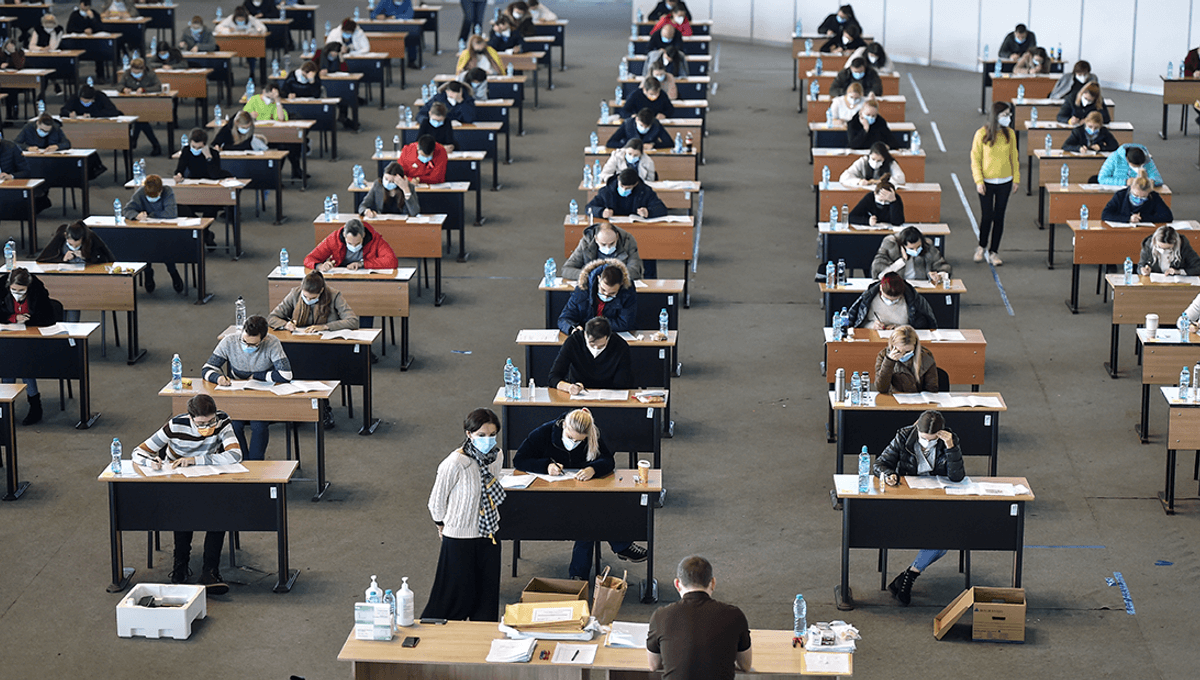
An unexpected feature of the room students sit their exams in may have an impact on their results, new research has found: a high ceiling.
Generally in school and higher education, students are taught in small rooms or lecture halls and study alone in normal-sized rooms. But come exam day, due to the high volume of people taking exams at the end of a year, students are placed in large rooms such as gymnasiums for their final tests.
While this may make sense from a cost and logistics point of view, recent research has suggested that rooms with high ceilings can impact brain activity associated with concentration. Researchers from the University of South Australia and Deakin University looked into this effect by looking at real-world data, taken from 15,400 undergraduate students across three campuses at an Australian university between 2011 and 2019, and the ceiling height of the rooms where they took their exams.
Accounting for factors such as coursework scores, students’ age, the time of year, the subject studied, and whether the student had taken exams on it before, the team found that there was a notable difference in performance between students sitting in rooms with normal and high ceilings.
“These spaces are often designed for purposes other than examinations, such as gymnasiums, exhibitions, events and performances,” Dr Isabella Bower, lead author of the paper, said in a statement. “The key point is that large rooms with high ceilings seem to disadvantage students and we need to understand what brain mechanisms are at play, and whether this affects all students to the same degree.”
It is unclear from this research alone what caused the poorer performance of students in rooms with higher ceilings.
“A key constraint of this naturalistic retrospective study is that we are unable to probe whether the observed result is direct result of the design quality of scale, or if differences arise because of the indoor environmental parameters afforded by the scale,” the team wrote in their paper. “For instance, as enlarged gymnasium spaces are often poorly insulated and are expensive to climate control, the observed effect may be due to lowered ambient temperature on the students, which has been shown to reduce cognitive function in young adults.”
Other factors could include unfamiliarity with the exam room, and the crowding of such rooms. Cognitive performance has been shown to decrease in crowded spaces, for example.
“Lastly, the smaller room scale may allow students more opportunities to cheat,” the team continues. “While the proctor to student ratio is far higher, the student-to-student ratio is lower reducing peer surveillance and monitoring which may influence if a student cheats by smuggling in notes.”
However, though we do not know the mechanism, room size does appear to be a partial factor. Previous research by the team placed participants in VR environments which altered the size of the virtual “room” they were placed in, while electroencephalography (EEG) recorded the response in their brains, finding that brain activity involved in concentration on difficult tasks increased as participants sat in the larger virtual rooms. The research could lead to improvements in examinations and testing.
“In Australia, many universities and schools use large indoor spaces for exams to streamline logistics and costs. It’s crucial to recognize the potential impact of the physical environment on student performance and make necessary adjustments to ensure all students have an equal opportunity to succeed,” Bower added.
“These findings will allow us to better design the buildings in which we live and work, so we can perform to the best of our ability.”
The study is published in the Journal of Environmental Psychology.
Source Link: Your Exam Performance Could Be Affected By The Room You Take Them In